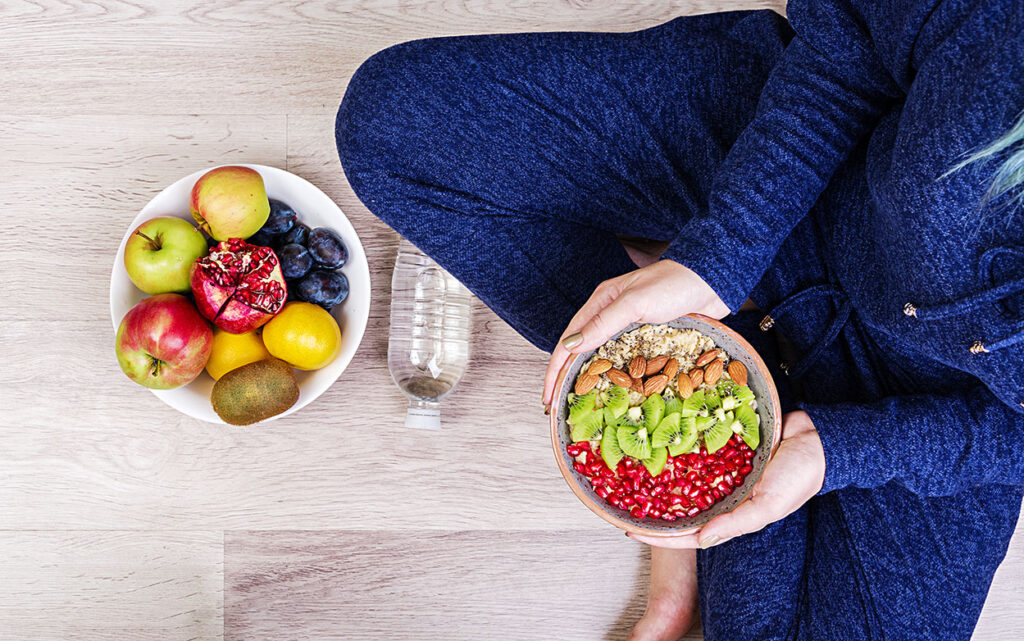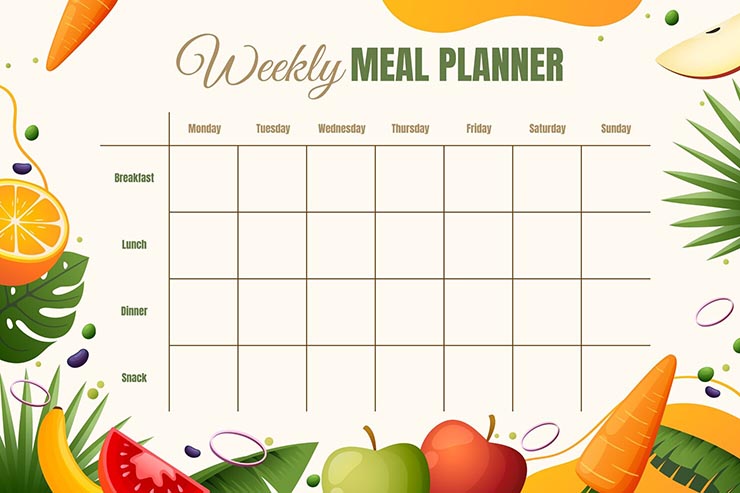Introduction:
Winter Diet Plan : As the frosty embrace of winter settles in, it’s not just the wardrobe that requires a change; our diet also needs adaptation to support our bodies during the cold months. A well-thought-out winter diet plan is essential to maintain good health, keep the immune system robust, and ensure energy levels stay high. Let’s delve into the key components of a nourishing winter diet plan that will keep you warm, healthy, and satisfied during the colder season.
Table of Contents
The Importance of a Winter Diet Plan: Winter can often lead to a shift in our dietary habits, favoring heartier, comfort foods that can sometimes be less nutritious. However, it’s crucial to maintain a balanced diet to sustain overall health and immunity. A winter diet plan is not about deprivation but about making smarter food choices, incorporating seasonal produce, and adjusting our meals to align with the body’s needs during this period.

Key Components of a Winter Diet Plan:
- Seasonal Fruits and Vegetables: Winter offers an array of seasonal fruits and vegetables that are not only delicious but also highly nutritious. Citrus fruits like oranges, grapefruits, and clementines are rich in vitamin C, which is essential for bolstering the immune system. Root vegetables such as carrots, beets, and sweet potatoes are packed with essential nutrients and are perfect for hearty soups, stews, and roasts.
- Protein-Rich Foods: Including ample protein in your winter diet plan is essential for maintaining energy levels. Lean meats like poultry and fish, along with vegetarian sources such as beans, lentils, and tofu, can provide the necessary protein. These foods not only keep you full and satisfied but also support muscle strength and overall vitality.
- Whole Grains and Fiber: Whole grains like quinoa, brown rice, and oats offer a great source of complex carbohydrates and fiber, which are crucial for maintaining steady energy levels and supporting digestive health. They are perfect for warm breakfasts or hearty grain-based salads.
- Healthy Fats: Incorporating healthy fats from sources such as nuts, seeds, avocados, and olive oil can aid in maintaining healthy skin, supporting brain function, and providing essential nutrients during the winter months.
- Hydration: Though it might be less appealing to drink cold water during winter, it’s crucial to stay hydrated. Opt for herbal teas, warm water with lemon, or soups to ensure you’re consuming an adequate amount of fluids.
Sample Winter Diet Plan:
Breakfast:
- Warm oatmeal topped with seasonal fruits and a sprinkle of nuts
- Herbal tea or warm water with lemon
Lunch:
- Hearty vegetable soup with whole grain bread
- Mixed green salad with nuts and a citrus-based vinaigrette
Snack:
- Greek yogurt with honey and mixed berries
- Handful of mixed nuts
Dinner:
- Grilled or baked salmon with roasted sweet potatoes and steamed broccoli
- Quinoa or brown rice pilaf
Here is winter diet chart to follow
Certainly! A winter diet should ideally include foods that keep you warm, provide essential nutrients, and help boost immunity. Here’s a sample winter diet chart:

Early Morning (6:30 AM – 7:00 AM):
- A glass of warm water with honey and lemon
Breakfast (8:00 AM – 9:00 AM):
- Oatmeal or whole grain cereal with nuts and seeds
- A fruit such as an apple, orange, or berries
- Herbal tea or warm almond milk
Mid-Morning Snack (10:30 AM):
- Greek yogurt with a handful of mixed nuts
Lunch (12:30 PM – 1:30 PM):
- Grilled chicken or tofu/paneer
- Quinoa or brown rice
- Steamed or sautéed winter vegetables (such as broccoli, carrots, sweet potatoes)
- A side salad with mixed greens, cucumber, and tomatoes
Afternoon Snack (3:30 PM):
- A fruit smoothie with banana, spinach, and almond milk
- Whole grain crackers with hummus
Dinner (6:30 PM – 7:30 PM):
- Lentil soup or vegetable stew
- Grilled fish or baked tofu/tempeh
- Steamed vegetables or a mixed vegetable curry
- Quinoa or whole grain bread
Before Bed (9:30 PM – 10:00 PM):
- A cup of herbal tea like chamomile or peppermint
- A small serving of nuts (almonds, walnuts) or a few slices of a low-sugar fruit (like a few slices of pear or apple)
General Tips:
- Stay hydrated throughout the day. Drink warm beverages like herbal teas or warm water with lemon.
- Include seasonal fruits and vegetables rich in Vitamin C (oranges, kiwi, spinach) to boost immunity.
- Consume a variety of protein sources such as lean meats, legumes, and nuts to stay energetic.
- Incorporate whole grains for sustained energy.
- Consume healthy fats like avocados, nuts, and seeds in moderation.
- Limit intake of processed and sugary foods.
Remember, this is a general guide and can be adapted according to individual dietary preferences, allergies, or specific health conditions. It’s always best to consult a nutritionist or a healthcare professional before making significant changes to your diet.
Winter diet plan for weight gain

Certainly! Gaining weight during the winter can be facilitated by a well-balanced and nutrient-dense diet. Here’s a sample winter diet plan to help with weight gain:
Breakfast:
- Oatmeal: Start your day with a bowl of oatmeal made with whole milk or almond milk, topped with nuts (almonds, walnuts) and sliced fruits (bananas, berries) for added calories and nutrients.
- Whole Grain Toast: Consider having whole grain toast with peanut butter or avocado for extra healthy fats and calories.
Mid-morning Snack:
- Greek Yogurt: Opt for full-fat Greek yogurt topped with honey, granola, and chopped fruits.
- Trail Mix: A handful of mixed nuts, seeds, and dried fruits.
Lunch:
- Quinoa Salad: Prepare a quinoa salad with mixed veggies (bell peppers, spinach, tomatoes) and a protein source like grilled chicken, tofu, or beans.
- Whole Grain Wrap: Fill a whole grain wrap with hummus, mixed greens, avocado, and your choice of protein (chicken, turkey, tofu).
Afternoon Snack:
- Cheese and Crackers: Enjoy a serving of cheese with whole grain crackers.
- Fruit Smoothie: Blend bananas, mangoes, yogurt, and a spoonful of nut butter for a high-calorie smoothie.
Dinner:
- Salmon/Chicken with Roasted Vegetables: Grill or bake salmon or chicken with olive oil and herbs, served with roasted sweet potatoes, carrots, and broccoli for added nutrients.
- Pasta: Have whole grain pasta with a rich tomato-based sauce, and add lean ground turkey or tofu for extra protein.
Evening Snack:
- Homemade Protein Bars: Make or purchase high-protein bars.
- Cottage Cheese: Have a serving of cottage cheese with sliced fruits.
Additional Tips:
- Increase Caloric Intake: Focus on healthy, high-calorie foods such as nuts, nut butters, avocados, and healthy oils.
- Protein Intake: Ensure each meal contains a good source of protein to support muscle growth.
- Healthy Fats: Incorporate sources of healthy fats like avocados, nuts, seeds, and olive oil.
- Consistent Eating: Don’t skip meals. Eating at regular intervals can help maintain a caloric surplus.
Remember, gaining weight in a healthy manner involves a combination of a balanced diet and regular exercise. Consulting with a nutritionist or a healthcare professional can help create a more personalized plan tailored to your specific needs and health conditions.
Winter diet for weight loss

Winter can be a challenging time for those looking to maintain or lose weight due to the cozy ambiance often accompanied by hearty, calorie-rich foods. However, with the right approach and a focus on nutrient-dense, low-calorie foods, it’s possible to create a winter diet plan conducive to weight loss. Here’s a tailored approach to a winter diet plan for weight loss:
- Embrace Seasonal Produce: Opt for seasonal fruits and vegetables that are low in calories but high in nutrients. Include winter favorites such as citrus fruits, apples, pears, Brussels sprouts, kale, carrots, and winter squash. These can be the cornerstone of your meals, providing vitamins, minerals, and fiber without excess calories.
- Soups and Broths: Warm, low-calorie soups and broths can be incredibly filling and comforting during winter. Prepare vegetable-based soups or clear broths with lean protein sources like chicken or tofu. They are satiating and can be a substantial part of your weight loss diet.
- Lean Proteins: Incorporate lean protein sources like poultry, fish, legumes, and tofu. These foods not only provide the necessary protein to support muscle maintenance but also help in keeping you fuller for longer, reducing the tendency to overeat.
- Whole Grains in Moderation: Choose whole grains like quinoa, barley, or brown rice, but keep portions in check. Whole grains are high in fiber and nutrients, but they also contain calories. Balancing portions is key when aiming for weight loss.
- Healthy Fats: Include healthy fats in your winter diet but in moderation. Opt for sources like avocados, nuts, seeds, and olive oil, as they provide essential nutrients and support a feeling of fullness.
- Hydration: Keep yourself well-hydrated with warm herbal teas, infused water, and low-calorie beverages. Sometimes thirst can be mistaken for hunger, leading to unnecessary snacking.
- Mindful Snacking: Choose low-calorie, nutrient-rich snacks such as Greek yogurt with fruits, a handful of nuts, vegetable sticks with hummus, or a small portion of air-popped popcorn. Mindful snacking can help curb hunger without compromising your weight loss goals.
By focusing on nutrient-dense, low-calorie foods and controlling portion sizes, you can create a winter diet plan that supports weight loss while still enjoying the comforting flavors of the season. Coupled with regular physical activity, this approach can help you reach your weight loss goals in a healthy and sustainable manner. Always consult a healthcare professional or a nutritionist before making significant changes to your diet, especially if you have any underlying health conditions.
Suggestion for winter diet food
In the winter, it’s beneficial to consume foods that provide warmth, nourishment, and help boost the immune system. Here are some food suggestions for a winter diet:
- Root Vegetables: Root vegetables like sweet potatoes, carrots, beets, and parsnips are in season during winter. They are rich in nutrients, fiber, and can be roasted, stewed, or made into soups.
- Citrus Fruits: Oranges, grapefruits, clementines, and lemons are abundant in winter and are packed with vitamin C, which can help boost your immune system.
- Dark Leafy Greens: Vegetables like kale, spinach, and Swiss chard are excellent sources of vitamins and minerals. They can be added to soups, stews, or simply sautéed as a side dish.
- Whole Grains: Whole grains like quinoa, brown rice, oats, and barley provide warmth and energy. They’re also high in fiber, which can keep you feeling full and satisfied.
- Nuts and Seeds: Walnuts, almonds, pumpkin seeds, and chia seeds are nutritious options. They’re rich in healthy fats, protein, and essential nutrients.
- Soups and Stews: Warm, hearty soups and stews made with vegetables, beans, and lean meats are comforting and can be packed with nutrients.
- Herbal Teas: Herbal teas like chamomile, ginger, or peppermint can provide warmth and have various health benefits.
- Fatty Fish: Fish like salmon, mackerel, and sardines are high in omega-3 fatty acids and can help support overall health, especially during winter.
- Spices: Incorporate warming spices like cinnamon, ginger, turmeric, and garlic into your meals. These spices not only add flavor but also have potential health benefits.
- Hot Cocoa or Dark Chocolate: In moderation, dark chocolate or a cup of hot cocoa made with dark cocoa powder and a natural sweetener can be a comforting treat that also provides antioxidants.
Remember, staying hydrated is crucial even in colder months. Drinking enough water and herbal teas can help maintain good health.
Always try to maintain a balanced diet, and consider your individual dietary needs and any health conditions you might have before making significant changes to your diet.
Conclusion:
A well-crafted winter diet plan is all about balance, incorporating seasonal produce, and making mindful food choices. By focusing on nutrient-rich, warming foods, you can maintain your health and vitality throughout the colder months. Embrace the winter with a diet plan that not only keeps you warm but also nourishes your body from within. Stay cozy, stay healthy!
Implementing these dietary tips can ensure a more balanced and health-supportive winter, allowing you to relish the joys of the season without compromising your well-being.
Winter diet for dogs in india
During the winter season, it’s essential to adjust your dog’s diet to ensure they stay healthy and comfortable in the colder weather. Here are some tips for a winter diet for dogs in India:
- Balanced Diet: Ensure your dog’s diet remains balanced with a mix of proteins, fats, and carbohydrates. Adjust the quantity of food based on your dog’s size, age, and activity level. Consult a vet to determine the appropriate portions.
- Proteins: Protein is vital for your dog’s overall health. Include high-quality sources of protein such as lean meats (chicken, turkey, lamb) or plant-based proteins (lentils, chickpeas). You can also opt for commercial dog food with high protein content.
- Fats: Healthy fats are essential for energy and keeping your dog warm during winters. Consider adding a bit more fat to their diet, such as fish oil or coconut oil. Be cautious not to overdo it, as too much fat can lead to obesity.
- Complex Carbohydrates: Include complex carbohydrates like brown rice, sweet potatoes, or oats to provide energy. These also aid in digestion and can help in maintaining body heat.
- Fruits and Vegetables: Incorporate a variety of fruits and vegetables into your dog’s diet to provide essential vitamins and minerals. Carrots, pumpkin, apples (without seeds), and leafy greens are good options.
- Hydration: Ensure your dog stays well-hydrated even in colder weather. Sometimes dogs tend to drink less water during winters, so keep an eye on their water intake. Offer lukewarm water to make it more appealing.
- Avoid Harmful Foods: Refrain from giving your dog foods that could be harmful, like chocolate, grapes, raisins, onions, garlic, and certain nuts. These can be toxic to dogs.
- Limit Treats: It’s tempting to give more treats during winter, but be cautious about overfeeding. Stick to healthy treats or consider making homemade treats using dog-friendly ingredients.
- Monitor Weight: Keep an eye on your dog’s weight. Dogs tend to be less active during the winter, so adjust their food intake accordingly to prevent weight gain.
Remember, it’s crucial to consult with a veterinarian before making any significant changes to your dog’s diet, as each dog’s needs can vary. Additionally, if your dog has any health conditions or special dietary requirements, the vet’s advice is especially important in ensuring their well-being during the winter season.
FAQ for Winter diet plan
Q: Why is a winter diet plan important?
A: During winter, our bodies often crave heartier, warmer foods. A winter diet plan helps maintain energy levels, supports the immune system, and provides necessary nutrients during the colder months.
Q: What foods should be included in a winter diet?
A: Opt for seasonal fruits and vegetables like citrus fruits, root vegetables (carrots, beets), winter greens (kale, spinach), and hearty grains (quinoa, oats). Incorporate warming spices like cinnamon, ginger, and turmeric.
Q: Are there specific foods to boost immunity during winter?
A: Yes, foods rich in vitamin C (citrus fruits, bell peppers), vitamin D (fatty fish, fortified dairy), zinc (pumpkin seeds, legumes), and probiotics (yogurt, kefir) can bolster the immune system.
Q: How can I stay hydrated during winter?
A: Though it’s colder, it’s essential to stay hydrated. Herbal teas, warm water with lemon, and broth-based soups are excellent options to maintain hydration.
Q: Are there particular foods that provide warmth during winter?
A: Foods with warming properties like soups, stews, herbal teas, and spices such as ginger, cinnamon, and cayenne pepper can help keep you warm.
Q: Can I indulge in comfort foods while maintaining a healthy diet?
A: Yes, you can enjoy comfort foods by making healthier versions. For instance, opt for baked sweet potato fries instead of regular fries or homemade vegetable soups over creamy, high-fat options.
Q: Is there a specific meal timing for a winter diet?
A: There’s no strict rule, but having regular meals and snacks throughout the day can help maintain energy levels. Ensure that each meal includes a balance of proteins, healthy fats, and carbohydrates.
Q: How can I maintain a balanced diet in winter?
A: Aim for a variety of foods including fruits, vegetables, whole grains, lean proteins, and healthy fats. Pay attention to portion sizes and try to limit processed or sugary foods.
Q: Should I take supplements during winter?
A: It’s best to obtain nutrients from food, but in winter, due to limited sun exposure, a vitamin D supplement might be recommended. Consult with a healthcare professional before starting any supplements.
Q: Are there specific exercises or activities to complement a winter diet?
A: Engage in indoor workouts, yoga, or even outdoor activities like skiing or ice skating, weather permitting. It’s important to stay active even during the colder months.
Remember, it’s always a good idea to personalize a diet plan according to your individual health needs and preferences. If you have specific dietary concerns or health conditions, it’s wise to consult a nutritionist or healthcare professional.



